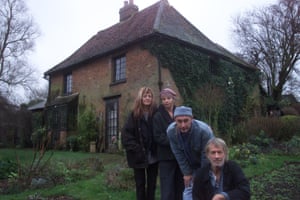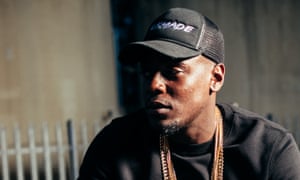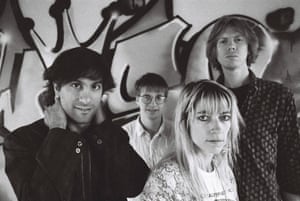'People are taking safer choices': six alternative artists on today's musical underground
Thurston Moore, The Black Madonna and other underground musicians discuss how the scene continues to mutate – and why quantum physics is where today’s avant garde truly resides
The Black Madonna, DJ and producer
The first time I ever heard of a rave was in a Big Audio Dynamite record, then I saw them on TV. So the second I heard there was a rave in America I was literally out of the window of the place I had been staying. And that was it, I was gone. I barely remember high school. I quit to work in raves full time the second I realised there was another world that you could go to. The idea of living a second life that other people were not aware of was delicious.
I was in the dance underground as it was going through its birth in the US in 1991. We had no road map at all. Now, it’s easy to link that to a better thing than it was; a lot of things that get gilded in nostalgia are actually really shitty. It meant smiling and nodding while women around me were not getting paid. There were a lot of voices that got squashed. There was this “you’re harshing the mellow of the party” if you talk about the fact that there’s a thousand teenage girls here on ecstasy who are not able to give consent.
Dance music is different now. You can only have a total lack of self-awareness once – now, no matter what, there is at least a nominal reference to history in it. It’s also so much bigger now, and there are places I play that are deeply public. The cops know what we’re doing – there’s transparency there, and surely something is lost in that. Having said that, I do still believe that the act of dance music is in fundamental opposition to acts of war and acts of violence. In this world, you can do a lot worse than taking a whole shit-ton of people and having them dance instead of kill each other.
Thurston Moore, guitarist and co-founder of Sonic Youth
Penny Rimbaud, co-founder of Crass

Essentially, the avant garde is about changing the world. It must be, otherwise it wouldn’t exist. But I always think terms like underground and alternative are a bit disingenuous – a way of pushing stuff to the side. That certainly happened in the punk domain, when you had overtly commercial music being made by people like the Clash and the Pistols, and then you had what was called anarcho-punk, which apparently wasn’t a part of that. Well, actually, Crass – as the creators of the anarcho-punk movement – were outselling most people.
Crass were activists with rock’n’roll pretensions. You can’t really expect rock’n’rollers to have activist pretensions – rock’n’roll is just part of the entertainment industry. The scream doesn’t seem to be coming through musically as much as it might have been doing 40 years ago – punk created a new standard of disrule, which will be hard to beat. But people tend to think nothing’s happening because it’s not happening in music. It’s happening in quantum physics. If you want to read the new avant garde, read quantum physics – scientists are just artists of a different kind.
Holly Herndon, electronic musician

In the 90s, underground artists were able to sell hundreds of thousands of records and have their own economic viability, so they could make whatever music they wanted without having to compromise at all. You could have a pretty out-there artist making a middle-class salary, not having to worry about doing brand partnerships or any of that stuff because it was sustained by the public. And that doesn’t exist in the same way. The economics of the situation have shifted so dramatically, it’s like a house on fire.
Advertisement
When I was in high school, I went to music for ideas and to understand what my identity could be – and I think that’s shifted. I’m not sure music is the place where radical thought is happening any more. I’m interested in the crypto community, people who are interested in radically changing the infrastructure that organises our society. Those kinds of totally out-there ideas and thought processes I don’t really encounter in music quite so much.
Everything is documented and immediately public now, so I don’t feel like people in the underground have the ability to mess up and experiment in the same way they once did, because there’s such scrutiny on people at a really early stage. I’ve had some brutal shows in my life but I needed them to figure out my process, that’s idiosyncratic to me. I see people taking safer choices because they don’t want to fail as they’re being watched from every angle. What you get then is these baby clones, where everyone’s looking really polished but they’re all dressing as each other, and that’s not good for the health of the music community.
Mist, rapper

The underground scene is basically an A&R system in the streets, which allows the mainstream to know about music. When you make enough noise in the underground scene, the mainstream is bound to hear it. It worked for me through word of mouth – my manager met me through his nephew showing him one of my songs.
Advertisement
Coming from Birmingham, you’re knocking on the London doors, trying to get on the London radio stations, even the London YouTube channels. SBTV was the first channel outside of Birmingham that I went on. And then the rest just follows: Link Up TV, GRM Daily. Then when you get Fire in the Booth [on BBC 1Xtra], you’re not so underground any more – I can’t go anywhere without getting noticed.
I remember listening to pirate radio growing up, and a lot of the MCs didn’t really get much out of their career. Now with the internet platforms and social media, it’s easy for you to get your music out there for people to listen to it. While I’ve been coming up a lot of social media sites have been coming up as well. Instagram, for instance, wasn’t used as much – when I first started it was just for pictures. Social media plays a big part. I met [producer] Banglez through social media. If I didn’t have it, I don’t know how any of us would have connected with each other.
Dani Filth, frontman of metal band Cradle of Filth

At the time Cradle of Filth started in 1991 you had the onset of grunge, which really killed metal off. It just all became a bit uncool. Grunge was very mainstream, so it drove heavy metal underground, and heavy metal got more extreme. When we began making music, you had to be Don Johnson to own a mobile phone, so people kept in communication via home phone or telephone boxes. And that’s how our underground functioned, by word of mouth and swapping tapes by post. Flyers were very popular. You’d get a thick letter through the post, one tape and the rest would be about a hundred flyers, which you’d then pass on with your next correspondence. At that point I was perpetually drawing fanzine covers to pay for inclusion of the band in fanzines, or just writing letters to penpals and distributors.
I don’t want to sound like an old rocker, but I think people have become a little bit more fickle because of the immediacy of technology. The attention span goes. Metal is exceedingly loyal, but I don’t know how strong people’s commitment to any one band or anything is nowadays.
I have another band called Devilment, and the people I’m in the band with are all from the local music scene in Suffolk. So it’s been like putting your foot back into the waters of the underground. It’s changed quite a bit, I suppose. The metal scene is very crowded because it’s very easy to make music these days as well – after a while, everyone starts sounding the same. When you’ve got thousands and thousands of bands and it’s been going on for 25 years, it’s all going to cross over. The originality is lost.















